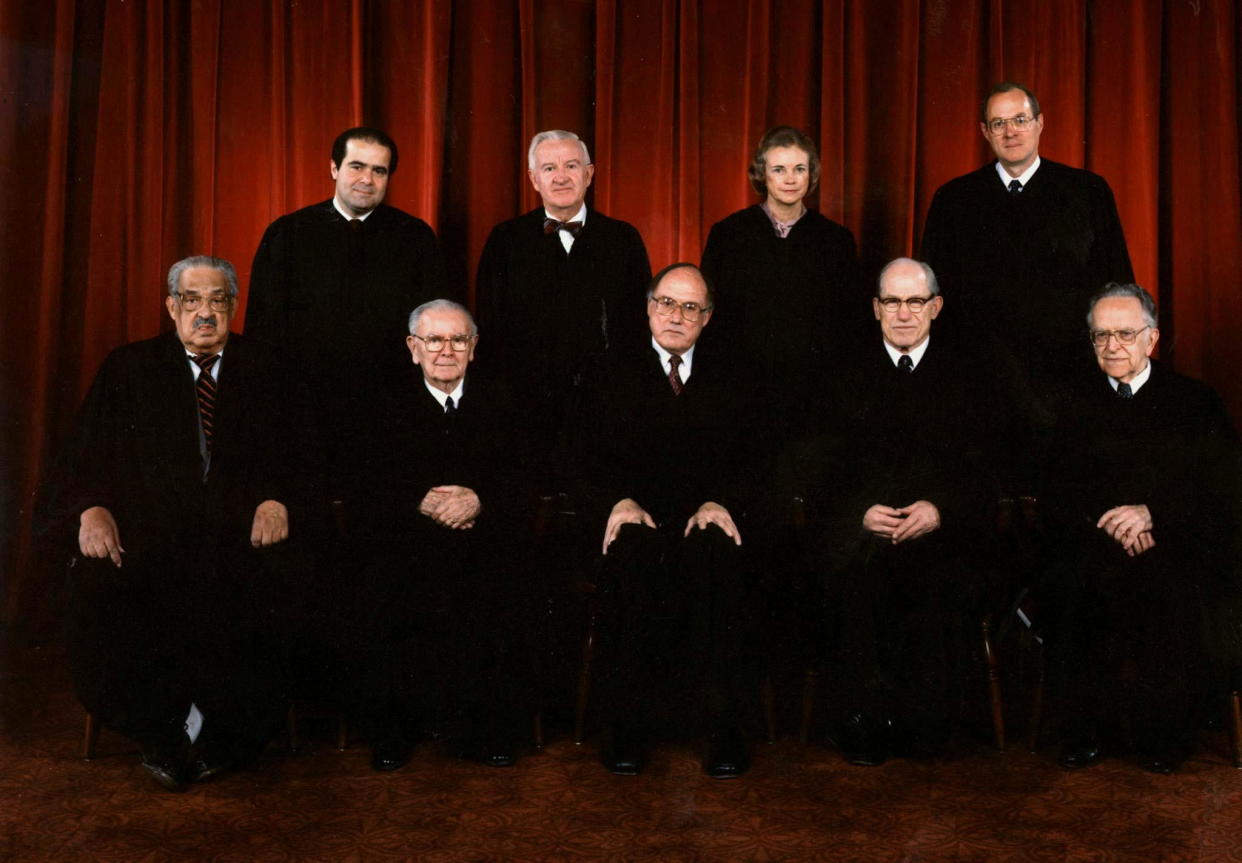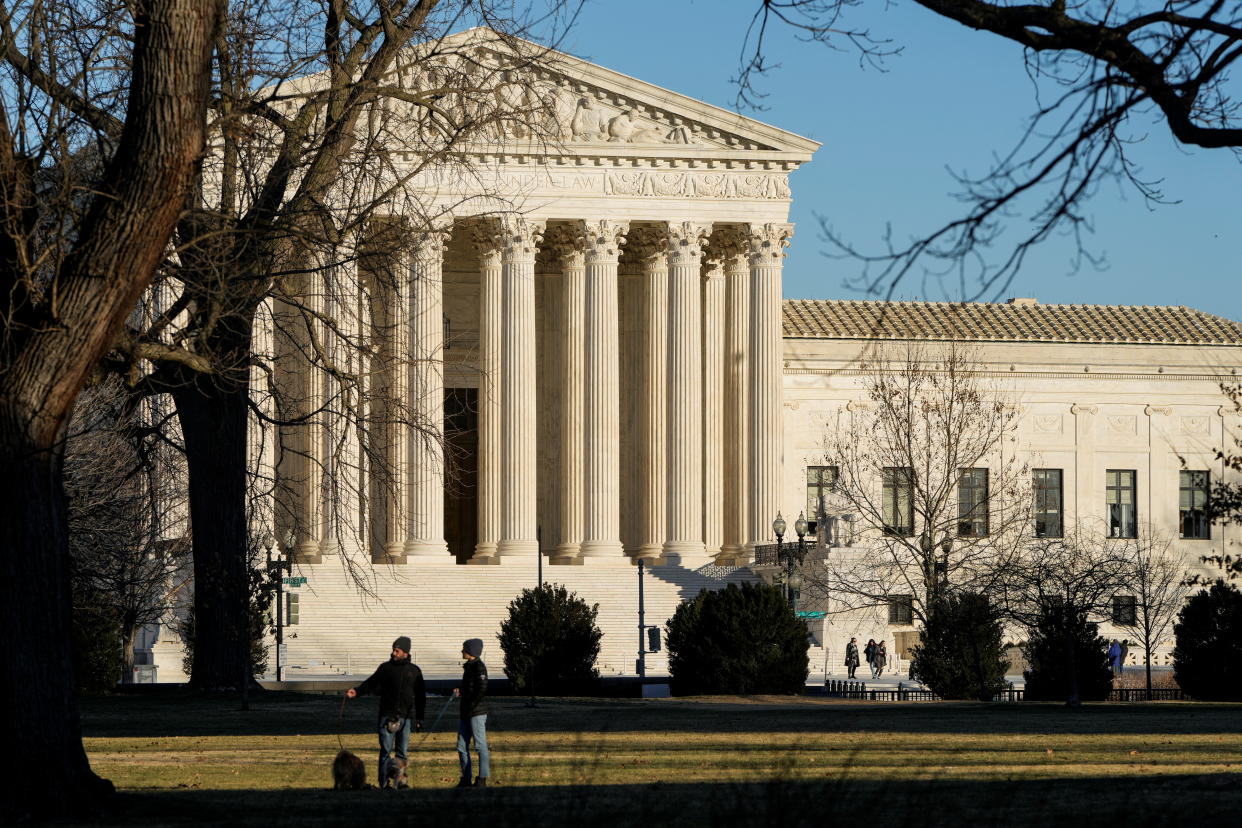Black legal professionals hail Biden's historic Supreme Court promise
On Jan. 27, President Biden made history by announcing that he would nominate a Black woman to the Supreme Court by the end of February.
“While I’ve been studying candidates’ backgrounds and writings, I’ve made no decision except one,” Biden said in remarks made at a White House event to formally announce the retirement of 83-year-old liberal Justice Stephen Breyer. “The person I will nominate will be someone of extraordinary qualifications, character, experience and integrity. And that person will be the first Black woman ever nominated to the United States Supreme Court. It’s long overdue.”
Biden’s vow reaffirmed a campaign pledge and is being hailed by Black legal professionals.
“This is tremendously exciting news. It is something that the NAACP has been calling for. We need Black women at every level of the judiciary, and especially on the highest court of the land,” NAACP general counsel Janette McCarthy Wallace told Yahoo News. “Beginning with Judge Jane Bolin and Judge Constance Baker Motley, Black women have been highly qualified and exceptional judges — and as such, they have been valuable members of the judicial system and they made incredibly unique contributions.”
As the “final arbiter of the law,” the Supreme Court is charged with “ensuring the American people the promise of equal justice under law.” But since the establishment of the high court in 1789, Black women have been excluded as jurors.
“African American women have historically operated under the disabilities of being women and Black, particularly during times when those groups had less power,” Annette Gordon-Reed, a Harvard law professor and Pulitzer Prize–winning historian, told Yahoo News. “To fight through, that has often required great resilience and creativity.”
Since 1789, U.S. presidents have submitted 163 Supreme Court nominations. Wallace noted that out of 114 justices who have served, 108 of those have been white men. It would not be until 1967 that Thurgood Marshall would become the first Black man nominated and confirmed to a seat on the high court. In 1981, Sandra Day O’Connor became the first woman justice.
Expanding the diversity of the court, Wallace said, helped broaden the perspectives it brought to bear in its decisions.

“Justice Thurgood Marshall added to the debate and discussion on the court. Justice Sandra Day O'Connor famously spoke of the unique contribution he brought to conferences about cases that was shaped by his background and life experiences as a civil rights lawyer,” Wallace said, adding, “This is not just about another vote. We need a powerful voice on the court who has a record of demonstrated commitment to civil and human rights. Someone who can speak truth to power.”
Many Black lawmakers agree with Wallace, and on Thursday, 14 Black female members of Congress penned a letter to Biden hailing the president’s move to nominate a Black woman while urging the administration to choose its nominee wisely.
“The nomination of a Black woman is not mere symbolism; it is an essential step for our country’s promise of justice for all,” the women said wrote. “It is therefore of utmost importance that the administration appoints a Black woman with a strong track record of advancing civil and constitutionally protected rights, and whose work has shown dedication to affirming the rights of our country’s most marginalized communities.”
Leslie D. Davis, CEO of the National Association of Minority and Women Owned Law Firms, also cautioned against simply nominating a Black woman to fill a quota.
“Black women aren’t monolithic. So we can’t assume that would mean that a Black woman’s voice would vote a specific way,” Davis told Yahoo News. “The hope is that she would bring us another perspective, a different background and experience, some cultural understanding, some deeper level of expertise and kind of a special brand of je ne sais quoi that’s different than what is currently on the court.”
“I would hope there is a nominee who has had a set of experiences as a judge and as a lawyer that can inform the development of American law across a range of areas, and can bring perspective and voice,” Olatunde Johnson, a professor at Columbia Law School, told Yahoo News. “It’s not just about whether a court or a justice votes one way or the other. It’s how they explain their reasons and that makes a big difference to the public, whether they’re in dissent or in the majority. I think about Sonia Sotomayor and the issues she gives voice to around gender and race and ethnicity, but not just limited to that. She also gives voice to how the court operates, and the transparency of the court.”
Just 4.7 percent of American lawyers are Black and 37 percent of lawyers are female, according to a 2021 American Bar Association analysis. Based on that report, the New York Times estimates that 2 percent of American lawyers are both Black and female. Throughout American history, just 70 out of 3,843 — fewer than 2 percent — of the people who have served as federal judges in the U.S. have been Black women, according to the Federal Judicial Center.
“Systemic discrimination in education and employment is largely responsible for the small percentage of Black women attorneys,” Wallace stated. “Black women encounter barriers at all levels of education from K-12 up through law school. Then when we graduate, we experience obstacles in legal employment. All of this converges to keep extraordinarily qualified Black women from the federal bench. The opportunities are diminished and there are many headwinds. Before President Biden took office, only eight Black women had ever served as federal appellate judges. Biden has now nominated nine more, but there is much more work to do.”
Biden’s decision to limit his search for a nominee to replace Breyer to a Black woman hasn’t received universal support. Sen. Ted Cruz, R-Texas, sees that as inherently unfair.
“The fact that he's willing to make a promise at the outset, that it must be a Black woman, I got to say that’s offensive,” Cruz said on a recent podcast. “You know, Black women are what, 6 percent of the U.S. population? He's saying to 94 percent of Americans, ‘I don't give a damn about you, you are ineligible.’”
Sen. Roger Wicker, R-Miss., went even further, suggesting that Biden’s decision to pick a Black woman should be seen as ironic given that the high court will soon hear arguments on whether to outlaw considerations of race in college admissions.
“The irony is that the Supreme Court is at the very time hearing cases about this sort of affirmative racial discrimination while adding someone who is the beneficiary of this sort of quota,” Wicker, who is white, said in a recent radio interview.
A new Yahoo News/YouGov poll shows that 55 percent of Americans say nominating a Black woman to the Supreme Court is “not important.” Just 23 percent say it is “very important.”

“I assume President Biden has been aware of talented Black women in the law and the judiciary who are qualified to be on the court, and has had one of them in mind. The critics, on the other hand, just have not acknowledged their existence,” Gordon-Reed said in response to those upset at the idea of limiting the candidates to qualified Black women. “The notion that no Black woman qualified to be on the court could exist is wrongheaded and insulting.”
While the confirmation of Biden’s eventual nominee will not likely shift the court’s ideological balance, it will tilt its racial balance. That alone, legal scholars say, will make an impact.
“I think it's going to shape the way in which people design their own careers and their pathways, help them really imagine, dream,” Johnson said. “I think the flip side of that is that public and private institutions need to support that and make those pathways possible. I don’t think role models are enough and I think it’s a fallacy that it’s enough, but it’s a key part of it to just help young black girls, and I’d say, I hope a lot of people would be inspired by whoever’s appointed.
Wallace, a Black woman who remembers being dissuaded from entering the legal profession, recalled speaking to a class of fifth-graders about becoming a lawyer.
“When I told one of the girls in the class that I was an attorney, she responded that she did not know that Black women could be attorneys. Representation matters,” Wallace said. “This young lady’s meeting with me underscored the need for diversity in all professions, but particularly in the legal profession, where a young Black girl can see herself as someone who can affect the lives of others in a profound way. So, I am excited that countless Black girls can see themselves in the highest court in this land.”
Biden, who has said he hoped the diversity he has strived for during his first year in office will be a centerpiece of his legacy, said he would announce his nominee by the end of February. The White House is hoping for a swift confirmation process in the Senate.


